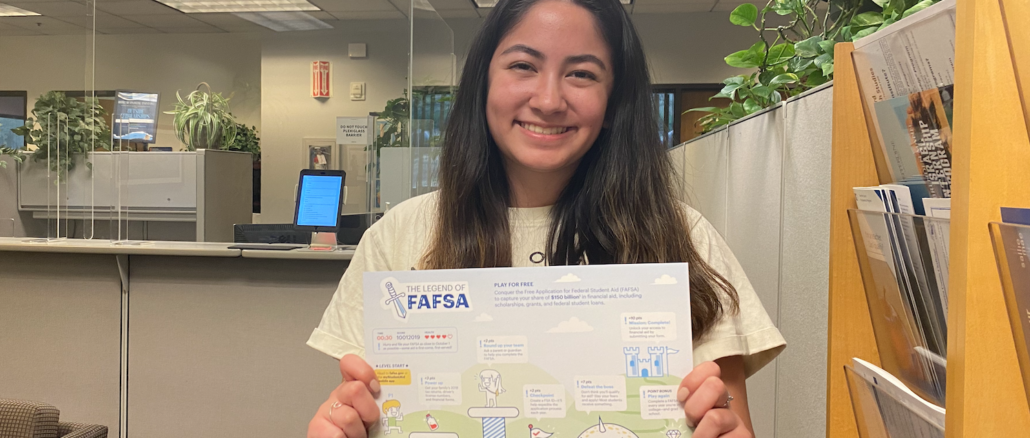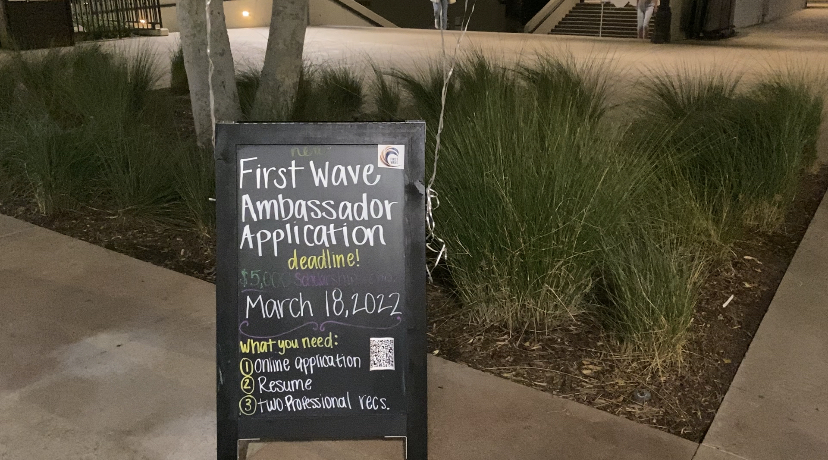
For any university student, applying for financial aid is a difficult process.
But for a first-generation college student, the task can be daunting.
Pepperdine defines first-generation college students on its website as “students whose parent(s) or legal guardian(s) have not obtained a bachelor’s degree from a four-year college or university.”
Generally, students have help from parents when filling out forms, such as the Free Application for Federal Student Aid or the FAFSA.
Often, first-generation college students are on their own. They even find themselves having to translate the FAFSA into another language for their parents or locate important tax information themselves.
Many first-generation students lack knowledge about how higher education works.
“When I was first applying to college, I had no idea what I was doing,” said Daniela Sandoval freshman international business major and first-generation college student.
Over the last four years, Pepperdine has worked to increase its support of first-generation college students through the creation of the First Wave Ambassador Program and similar programs. However, some first-generation college students at Pepperdine still feel lost when it comes to finances and often face additional hurdles when it comes to covering costs.
The process
The FAFSA form is made up of seven sections, including student demographics, school selection, dependency status, parent demographics and financial information for both the parent and the student.
More often than not, when a student files for financial aid for the first time, they file as dependent on their parents. This means that even if a parent is not planning to pay for their child’s college education, their income is still used as the basis for calculating the Expected Family Contribution, also known as the EFC.
Students filing for financial aid for the first time often have difficulty filling out the parent financial information section of the FAFSA.
“It is definitely daunting just being first-generation and not having anyone to kind of walk you through that process,” said Jerry Calderon, senior psychology and political science major and first-generation college student. “You are walking through it a little blindly, which offers its own set of difficulties.”
Calderon was a POSSE scholarship finalist, which gave him access to resources that aided in the college application process. But not all first-generation college students receive these kinds of resources.
Adriana Baez, senior liberal arts major on the teacher education tract and first-generation college student, agreed the FAFSA was confusing.
“And I think for parents of first-gen students, it’s extremely invasive,” Baez said.
For many first-generation college students, the EFC that the FAFSA produces can come as a shock. Many students think that the EFC is higher than what their families can actually afford to pay.
“For me, looking at that number and then thinking about my dreams and my hope to better things for my kids, [college] seemed almost unrealistic,” Baez said. “Why would I even try if this is going to be where I am? I would be in debt. It can be soul-destroying.”
Baez did not specify the amount of money she has to pay out of pocket for her education but she said the amount was overwhelming.
Based on the EFC, financial aid officials award students some combination of federal aid, institutional aid and scholarships. It is common for these awards not to cover the entire cost of attendance, so the student and their family must pay the difference, usually with loans.
Sandoval, whose EFC is $0, experienced this first-hand.
“Pepperdine is giving me about $30,000 and I have to come up with $25,000 on my own,” Sandoval said.
Added stressors
First-generation college students tend to experience more financial and academic distress than non-first-generation college students.
Many first-generation college students find themselves needing to get one or two jobs to make up for the funding gaps while maintaining their status as full-time students. This is particularly common at Pepperdine due to the high tuition and the higher cost of living in Malibu.
Funding gaps sometimes cause these students to delay purchasing textbooks and other course materials. As a result, students fall behind when it comes to schoolwork.
“There was a math book that was about $200, for just a regular Math 103 class,” Sandoval said. “I couldn’t afford it at that time so I had to rely on my friends or at times even miss homework assignments.”
Sandoval, who works for Jumpstart and is a sales associate at the Pepperdine Bookstore, said balancing work and school leaves her exhausted with little energy for much else.
“I have work every day throughout the week,” Sandoval said. “I get out of work at 6 p.m. or 7 p.m. and by that time, I’m exhausted. So when I try to study, I don’t even retain anything.”
Being a first-generation college student also exists at the intersection of multiple other identities, which may add extra elements for students to navigate.

What Pepperdine is doing
In recent years, Pepperdine officials have worked to help its first-generation college students by creating various programs.
The Student Success Center created the First Wave Ambassador Program to offer support to first-generation college students who are already at Pepperdine, as well as those considering applying. First Wave Ambassadors participate in the Pepperdine Summer Preview, where staff members give rising first-generation college students an opportunity to ask questions about the college application process and financial aid and participate in application workshops.
The First Gen club also gives first-generation college students the chance to participate in events and socialize with other students who share similar experiences.
“It’s a space of bridging social capital, where people from different identities that share that first-gen status can come together and support each other,” Crubaugh said.
The Student Success Center and the Office of Financial Aid are resources for all students. The SSC offers tutoring, academic coaching, academic resources and learning skills workshops, according to their website.
The Office of Financial Aid’s website provides financial aid information to both prospective and current students. The Office of Financial Aid is located on the first floor of the Thornton Administrative Center by One Stop and it is open to all students who have questions about financial aid.
“I think that the current programs, the First Wave Ambassadors, and the Student Success Center are doing well and the students are thriving with the programs that we have,” said Janet Lockhart, executive director of Financial Assistance at Pepperdine and first-generation college graduate.
Pepperdine’s website also has a list of outside scholarships that are available to all students but also some specifically for first-generation students.
“There are also outside resources for first-generation college students,” Lockhart said. “For example, Cash for College Workshops. These particular workshops are located all over the LA area and are hosted by the California Student Aid Commission and this is an excellent resource for any high school student that wants to go step by step through the FAFSA process.”
Moving forward
Although Pepperdine has worked to provide first-generation college students with resources, some students wish that the university would do more to support them financially.
“I don’t expect them to pay all of my tuition because that’s impossible to afford for everyone,” Sandoval said. “But I do think it would be helpful if there were more scholarship opportunities or some other way to help us financially.”
Pepperdine’s Office of Financial Assistance is open to suggestions that would improve the experience of first-generation college students.
“I’m sure that students, specifically first-generation students if they have additional requests or if there’s something that maybe we’re not doing that we can improve upon, we have an open ear and are ready to listen,” Lockhart said.
Isabella Tassone reported this enterprise story in Jour 241 during the Spring 2022 semester under the supervision of Dr. Christina Littlefield and Dr. Theresa de los Santos. Dr. Littlefield supervised the web article.




